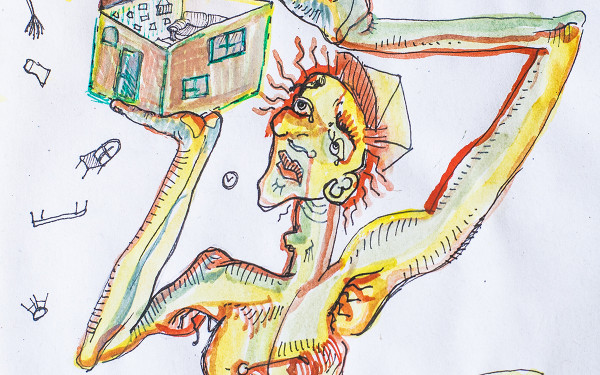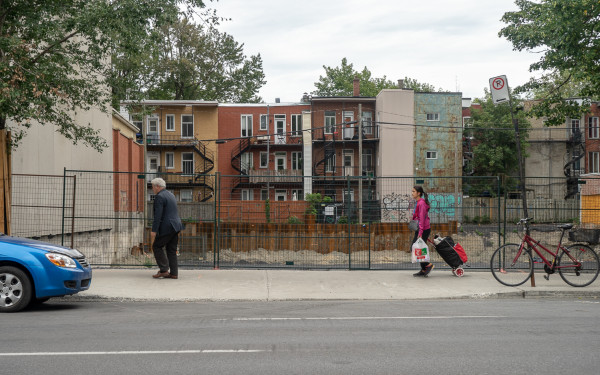Housing Abuse
With Limited Student Resources, Students Continue to Have Problems with Montreal Landlords
The hallways reeked of cigarette smoke. Walking up to the apartment, Karina Lafayette noticed there wasn’t a mailbox.
Still though, she needed a place to live, and thought any deposit she made that day would be returned if she didn’t sign a lease.
A suspiciously charismatic real estate agent from the RH Management company was showing her an apartment under renovations in Notre-Dame-de-Grâce.

Before even signing the lease for the apartment, Lafayette, a film production student at Concordia and contributor to The Link, could smell the scam from far away. She was asked to pay a $100 deposit before she had confirmed that she was taking the apartment, and was subjected to an intrusive background check that made her feel like a criminal.
Following her instinct, Lafayette decided not to take the apartment. She tried to get her deposit back, but that wasn’t an option.
“They told me I could move in whenever I wanted to when I had specifically written an email saying I’d find another place,” she recalled. “As a student you feel manipulated.”
Asking tenants for a deposit is illegal in Quebec.
She was originally told that the $100 deposit, which she paid in full, was supposed to cover part of the first month’s rent, which is within their right. But apparently, the real estate agent had already spent the money. She was never reimbursed.
“I sent an email to the rental board explaining my situation, but they said I had to call,” said Lafayette.
A representative from RH Management identified as Rubin, but refused to give a last name, said his company has a prospective tenant sign an application first. After this, they do a credit and criminal background check, and if they find “something bad,” they return the deposit.
Rubin said they don’t return the $100 because they spent money on a credit check, time on investigating the tenant’s potential criminal background, wasted days, and gas for getting around the city.
“If the other party says no, we have to keep the money,” he said.
It’s illegal to have the deposit unless it goes to first month’s rent. Rubin denied that the deposit was spent on anything other than the first month’s rent, and clarified that the depositor has credit of $100 to use on another apartment owned by RH Management.
It’s also illegal to include any clauses—like the application—on top of an official Quebec lease. Rubin said the deposit and application acts as a verbal lease, but to qualify as a verbal lease, one must purchase an official form from the Régie du Logement, Quebec’s rental board. It’s unknown whether the application RH Management uses this official document.
The Régie’s clarification on performing a criminal and extensive background check is not clear. It doesn’t explicitly say you can or can’t do it. But its code operates under the two basic principles of the right to privacy and the necessary character of the information collected.
When a tenant feels their landlord has mistreated them, they can file a complaint to the Régie, said Anita Lambton from Concordia Student Union’s Off-campus Housing and Job Bank (HOJO). However, she was quick to add that the process is too long.
“A hearing can take almost as long as an undergrad degree could. I think the average wait time is 24 weeks just to get the hearing,” said Lambton, who has been working at HOJO for over two years.
“There’s a lot of discrimination that goes on that’s really hard to prove,” said Lambton.
To prove these kinds of abuse, a written text is needed. “You can’t prove it in a way that the Régie or the police will want you to prove it and that’s a big problem,” she explained.
Several students who went to court for housing abuse were contacted to be interviewed for this story, but weren’t willing to publicly share their experiences here. According to the rental board’s annual report from 2014-2015, the overall average period to get a hearing was four to seven months.
Students can stop by HOJO’s office to receive information about their rights as tenants. It aims to protect students from experiences like Lafayette’s.
“There isn’t that much support in term of recourse,” said Lambton. “The Régie is really super problematic. A lot of the issues are pretty deep within the city.”
Since 2007, 284 complaints have been reported by HOJO. The most frequent complaints pertain to landlord’s abusing their rights.
“Landlords ask for things like SIN numbers, bank account numbers,” Lambton said. “Maybe it’s intimidation, maybe it’s weeding out who has a better job than other people.”
Either way, all of it is illegal.
International and out-of-province students are most often targeted by abusive landlords since they are less likely to know their rights, according to Lambton. Concordia University’s International Students Office has referred 40 per cent of first time visitors to HOJO.
Student housing issues are often dismissed, because of their status as just that, students. But students have the same rights as anybody, Lambton said, and more protection is needed to prevent exploitation of their occasionally vulnerable situations.

1_900_600_90.jpg)




